The Importance of Ethics and Professional Practices in Healthcare
VerifiedAdded on 2022/10/15
|9
|2240
|344
Essay
AI Summary
This essay examines the critical role of ethics in healthcare, focusing on ethical principles and professional practices. It highlights the significance of informed consent, emphasizing patient rights and the communication process between patients and healthcare providers. The essay then delves into the principle of confidentiality, discussing its importance in protecting patient information and the limited circumstances under which it can be breached. Furthermore, the essay addresses professional misconduct, outlining various unethical behaviors and actions. Finally, it explores the concept of ethical frameworks, which serve as guidelines for professionals to make ethical decisions, and underscores the importance of these frameworks in maintaining the integrity of healthcare practices and professional conduct.
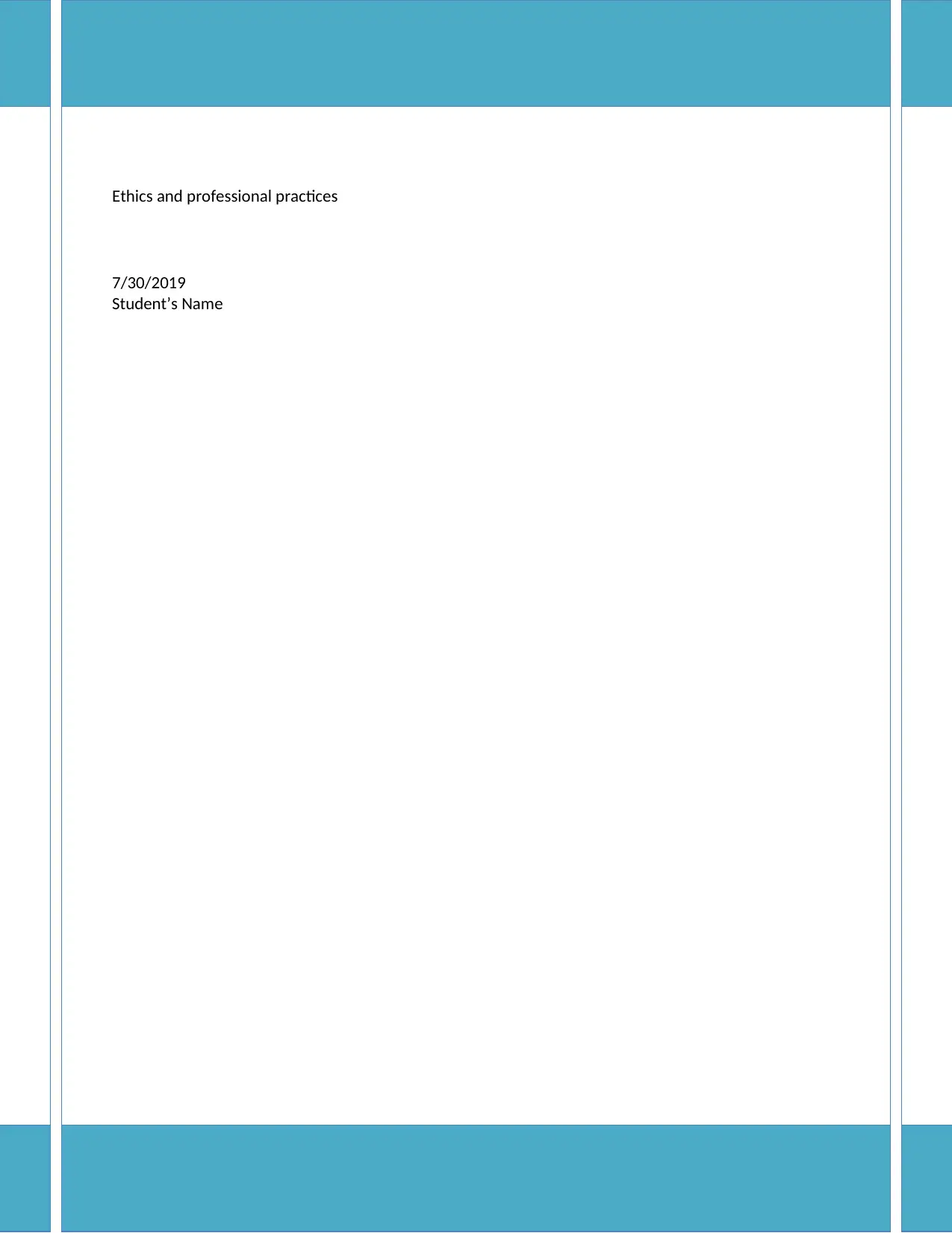
Running Head: Ethics And professional Practices
0
Ethics and professional practices
7/30/2019
Student’s Name
0
Ethics and professional practices
7/30/2019
Student’s Name
Paraphrase This Document
Need a fresh take? Get an instant paraphrase of this document with our AI Paraphraser
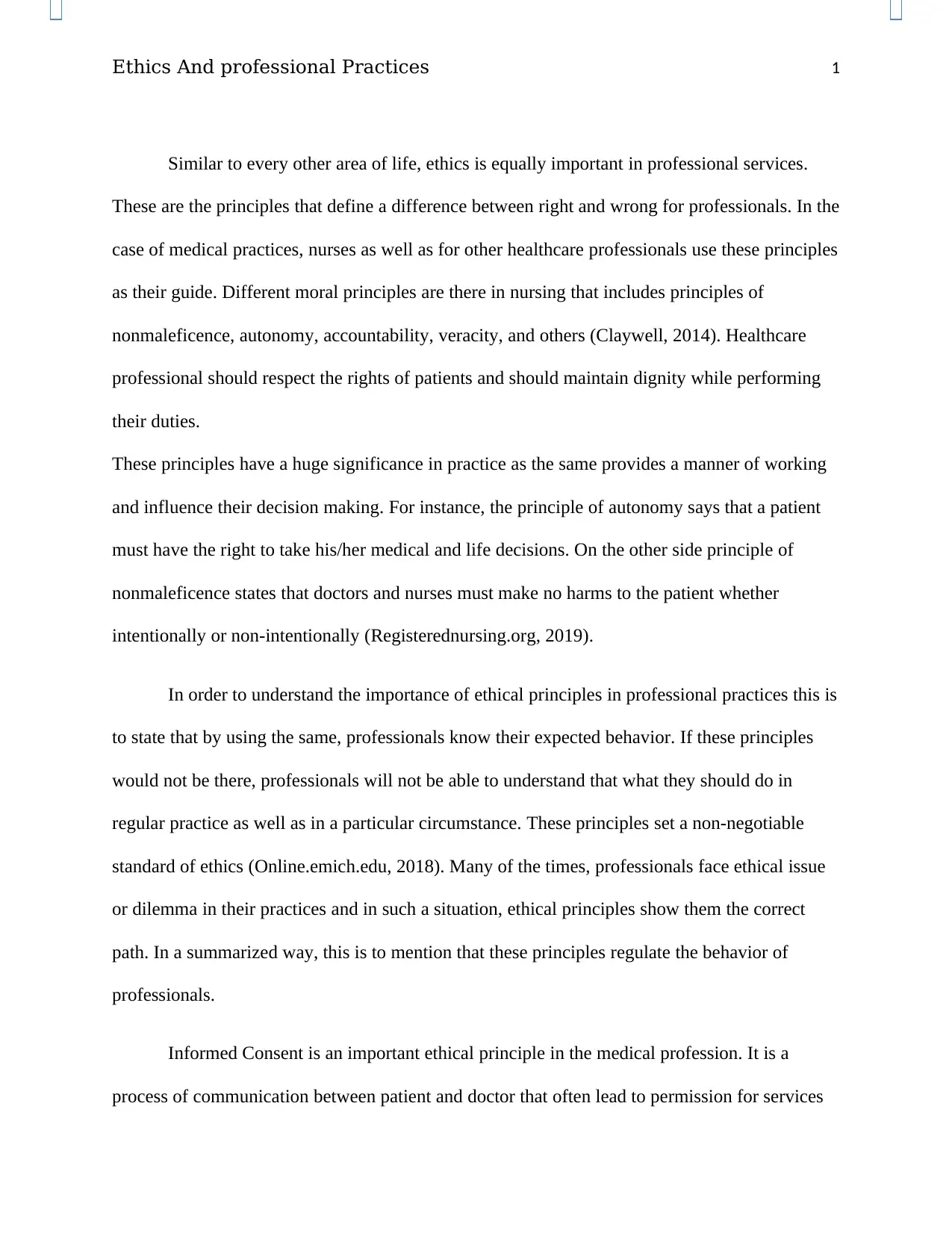
Ethics And professional Practices 1
Similar to every other area of life, ethics is equally important in professional services.
These are the principles that define a difference between right and wrong for professionals. In the
case of medical practices, nurses as well as for other healthcare professionals use these principles
as their guide. Different moral principles are there in nursing that includes principles of
nonmaleficence, autonomy, accountability, veracity, and others (Claywell, 2014). Healthcare
professional should respect the rights of patients and should maintain dignity while performing
their duties.
These principles have a huge significance in practice as the same provides a manner of working
and influence their decision making. For instance, the principle of autonomy says that a patient
must have the right to take his/her medical and life decisions. On the other side principle of
nonmaleficence states that doctors and nurses must make no harms to the patient whether
intentionally or non-intentionally (Registerednursing.org, 2019).
In order to understand the importance of ethical principles in professional practices this is
to state that by using the same, professionals know their expected behavior. If these principles
would not be there, professionals will not be able to understand that what they should do in
regular practice as well as in a particular circumstance. These principles set a non-negotiable
standard of ethics (Online.emich.edu, 2018). Many of the times, professionals face ethical issue
or dilemma in their practices and in such a situation, ethical principles show them the correct
path. In a summarized way, this is to mention that these principles regulate the behavior of
professionals.
Informed Consent is an important ethical principle in the medical profession. It is a
process of communication between patient and doctor that often lead to permission for services
Similar to every other area of life, ethics is equally important in professional services.
These are the principles that define a difference between right and wrong for professionals. In the
case of medical practices, nurses as well as for other healthcare professionals use these principles
as their guide. Different moral principles are there in nursing that includes principles of
nonmaleficence, autonomy, accountability, veracity, and others (Claywell, 2014). Healthcare
professional should respect the rights of patients and should maintain dignity while performing
their duties.
These principles have a huge significance in practice as the same provides a manner of working
and influence their decision making. For instance, the principle of autonomy says that a patient
must have the right to take his/her medical and life decisions. On the other side principle of
nonmaleficence states that doctors and nurses must make no harms to the patient whether
intentionally or non-intentionally (Registerednursing.org, 2019).
In order to understand the importance of ethical principles in professional practices this is
to state that by using the same, professionals know their expected behavior. If these principles
would not be there, professionals will not be able to understand that what they should do in
regular practice as well as in a particular circumstance. These principles set a non-negotiable
standard of ethics (Online.emich.edu, 2018). Many of the times, professionals face ethical issue
or dilemma in their practices and in such a situation, ethical principles show them the correct
path. In a summarized way, this is to mention that these principles regulate the behavior of
professionals.
Informed Consent is an important ethical principle in the medical profession. It is a
process of communication between patient and doctor that often lead to permission for services
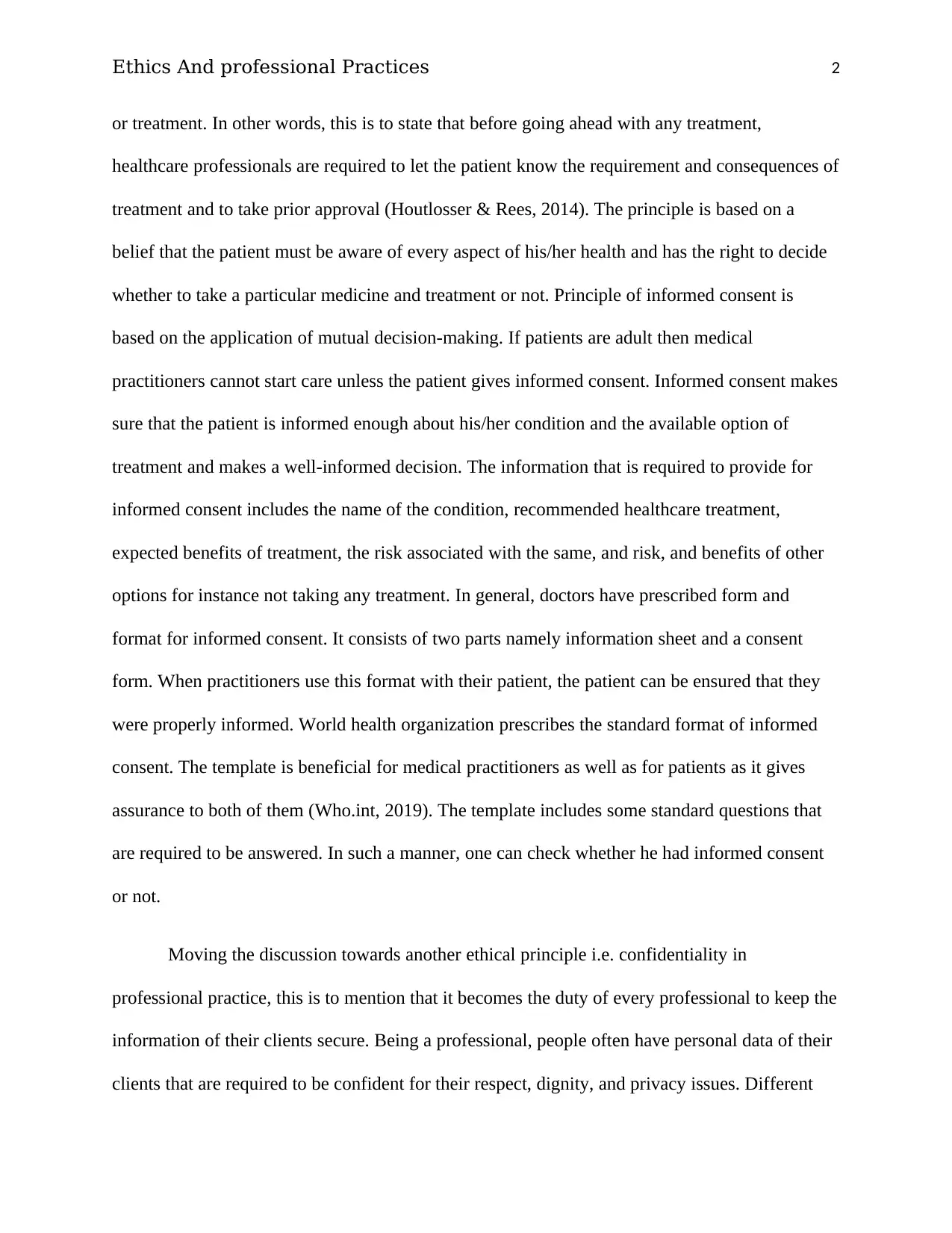
Ethics And professional Practices 2
or treatment. In other words, this is to state that before going ahead with any treatment,
healthcare professionals are required to let the patient know the requirement and consequences of
treatment and to take prior approval (Houtlosser & Rees, 2014). The principle is based on a
belief that the patient must be aware of every aspect of his/her health and has the right to decide
whether to take a particular medicine and treatment or not. Principle of informed consent is
based on the application of mutual decision-making. If patients are adult then medical
practitioners cannot start care unless the patient gives informed consent. Informed consent makes
sure that the patient is informed enough about his/her condition and the available option of
treatment and makes a well-informed decision. The information that is required to provide for
informed consent includes the name of the condition, recommended healthcare treatment,
expected benefits of treatment, the risk associated with the same, and risk, and benefits of other
options for instance not taking any treatment. In general, doctors have prescribed form and
format for informed consent. It consists of two parts namely information sheet and a consent
form. When practitioners use this format with their patient, the patient can be ensured that they
were properly informed. World health organization prescribes the standard format of informed
consent. The template is beneficial for medical practitioners as well as for patients as it gives
assurance to both of them (Who.int, 2019). The template includes some standard questions that
are required to be answered. In such a manner, one can check whether he had informed consent
or not.
Moving the discussion towards another ethical principle i.e. confidentiality in
professional practice, this is to mention that it becomes the duty of every professional to keep the
information of their clients secure. Being a professional, people often have personal data of their
clients that are required to be confident for their respect, dignity, and privacy issues. Different
or treatment. In other words, this is to state that before going ahead with any treatment,
healthcare professionals are required to let the patient know the requirement and consequences of
treatment and to take prior approval (Houtlosser & Rees, 2014). The principle is based on a
belief that the patient must be aware of every aspect of his/her health and has the right to decide
whether to take a particular medicine and treatment or not. Principle of informed consent is
based on the application of mutual decision-making. If patients are adult then medical
practitioners cannot start care unless the patient gives informed consent. Informed consent makes
sure that the patient is informed enough about his/her condition and the available option of
treatment and makes a well-informed decision. The information that is required to provide for
informed consent includes the name of the condition, recommended healthcare treatment,
expected benefits of treatment, the risk associated with the same, and risk, and benefits of other
options for instance not taking any treatment. In general, doctors have prescribed form and
format for informed consent. It consists of two parts namely information sheet and a consent
form. When practitioners use this format with their patient, the patient can be ensured that they
were properly informed. World health organization prescribes the standard format of informed
consent. The template is beneficial for medical practitioners as well as for patients as it gives
assurance to both of them (Who.int, 2019). The template includes some standard questions that
are required to be answered. In such a manner, one can check whether he had informed consent
or not.
Moving the discussion towards another ethical principle i.e. confidentiality in
professional practice, this is to mention that it becomes the duty of every professional to keep the
information of their clients secure. Being a professional, people often have personal data of their
clients that are required to be confident for their respect, dignity, and privacy issues. Different
⊘ This is a preview!⊘
Do you want full access?
Subscribe today to unlock all pages.

Trusted by 1+ million students worldwide
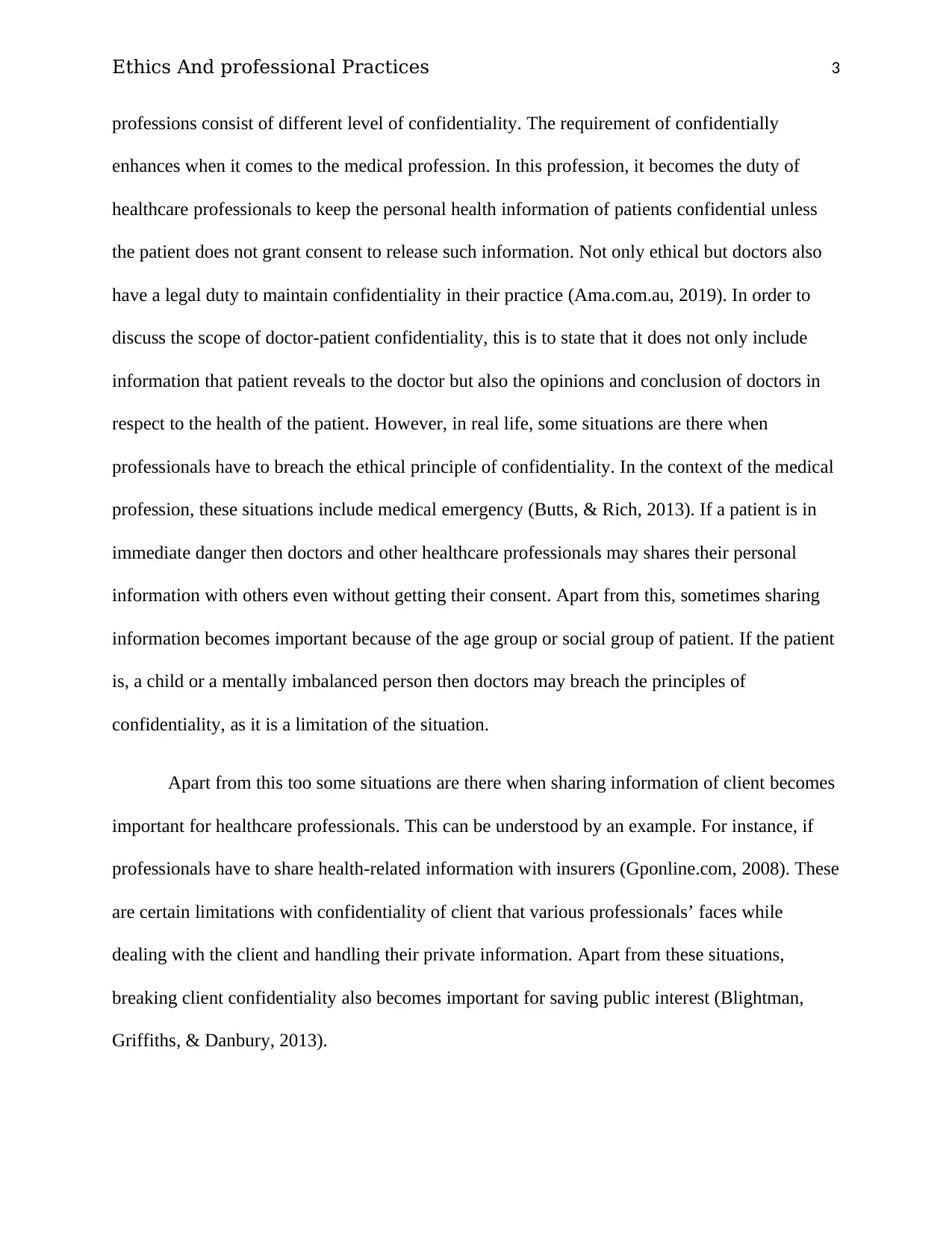
Ethics And professional Practices 3
professions consist of different level of confidentiality. The requirement of confidentially
enhances when it comes to the medical profession. In this profession, it becomes the duty of
healthcare professionals to keep the personal health information of patients confidential unless
the patient does not grant consent to release such information. Not only ethical but doctors also
have a legal duty to maintain confidentiality in their practice (Ama.com.au, 2019). In order to
discuss the scope of doctor-patient confidentiality, this is to state that it does not only include
information that patient reveals to the doctor but also the opinions and conclusion of doctors in
respect to the health of the patient. However, in real life, some situations are there when
professionals have to breach the ethical principle of confidentiality. In the context of the medical
profession, these situations include medical emergency (Butts, & Rich, 2013). If a patient is in
immediate danger then doctors and other healthcare professionals may shares their personal
information with others even without getting their consent. Apart from this, sometimes sharing
information becomes important because of the age group or social group of patient. If the patient
is, a child or a mentally imbalanced person then doctors may breach the principles of
confidentiality, as it is a limitation of the situation.
Apart from this too some situations are there when sharing information of client becomes
important for healthcare professionals. This can be understood by an example. For instance, if
professionals have to share health-related information with insurers (Gponline.com, 2008). These
are certain limitations with confidentiality of client that various professionals’ faces while
dealing with the client and handling their private information. Apart from these situations,
breaking client confidentiality also becomes important for saving public interest (Blightman,
Griffiths, & Danbury, 2013).
professions consist of different level of confidentiality. The requirement of confidentially
enhances when it comes to the medical profession. In this profession, it becomes the duty of
healthcare professionals to keep the personal health information of patients confidential unless
the patient does not grant consent to release such information. Not only ethical but doctors also
have a legal duty to maintain confidentiality in their practice (Ama.com.au, 2019). In order to
discuss the scope of doctor-patient confidentiality, this is to state that it does not only include
information that patient reveals to the doctor but also the opinions and conclusion of doctors in
respect to the health of the patient. However, in real life, some situations are there when
professionals have to breach the ethical principle of confidentiality. In the context of the medical
profession, these situations include medical emergency (Butts, & Rich, 2013). If a patient is in
immediate danger then doctors and other healthcare professionals may shares their personal
information with others even without getting their consent. Apart from this, sometimes sharing
information becomes important because of the age group or social group of patient. If the patient
is, a child or a mentally imbalanced person then doctors may breach the principles of
confidentiality, as it is a limitation of the situation.
Apart from this too some situations are there when sharing information of client becomes
important for healthcare professionals. This can be understood by an example. For instance, if
professionals have to share health-related information with insurers (Gponline.com, 2008). These
are certain limitations with confidentiality of client that various professionals’ faces while
dealing with the client and handling their private information. Apart from these situations,
breaking client confidentiality also becomes important for saving public interest (Blightman,
Griffiths, & Danbury, 2013).
Paraphrase This Document
Need a fresh take? Get an instant paraphrase of this document with our AI Paraphraser
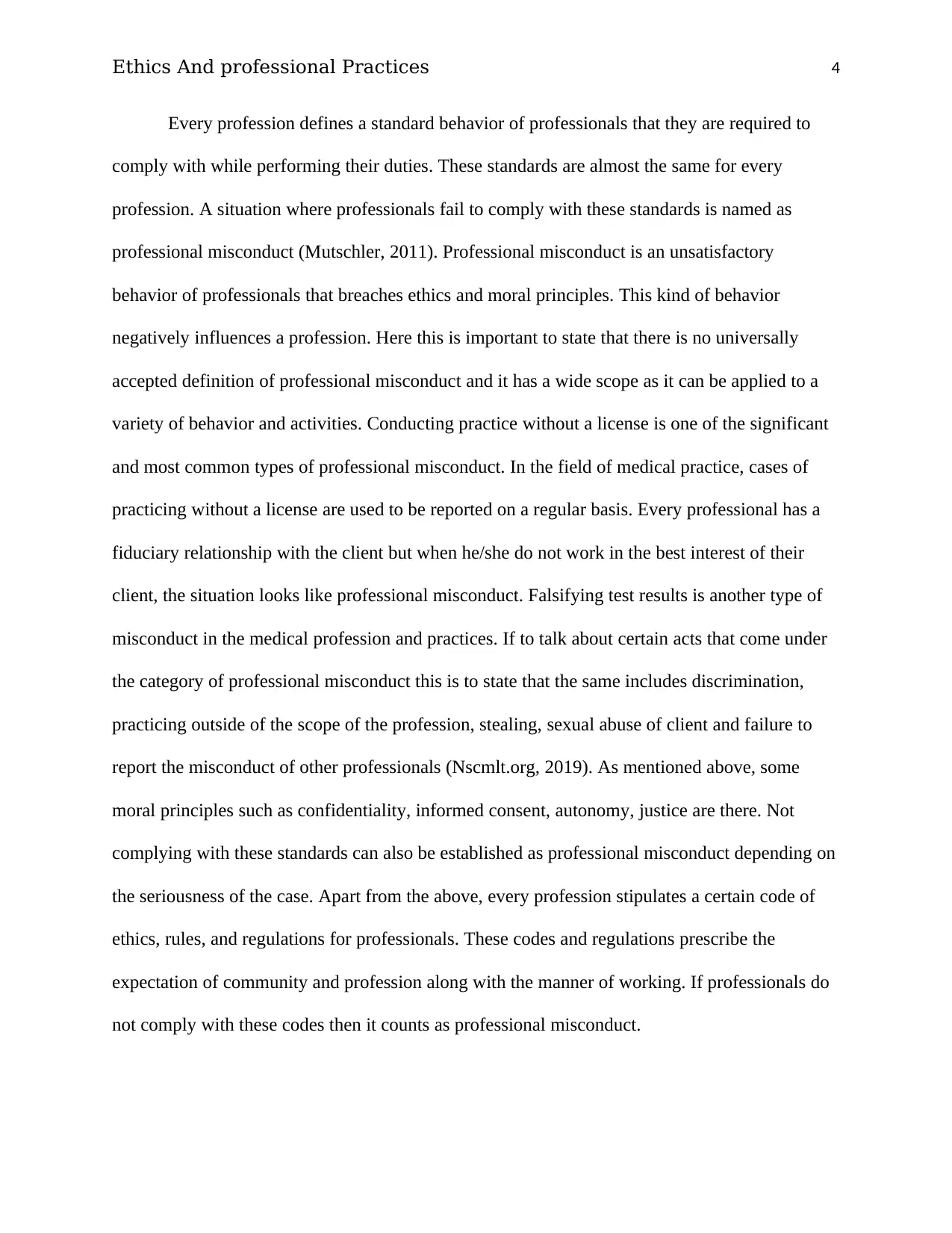
Ethics And professional Practices 4
Every profession defines a standard behavior of professionals that they are required to
comply with while performing their duties. These standards are almost the same for every
profession. A situation where professionals fail to comply with these standards is named as
professional misconduct (Mutschler, 2011). Professional misconduct is an unsatisfactory
behavior of professionals that breaches ethics and moral principles. This kind of behavior
negatively influences a profession. Here this is important to state that there is no universally
accepted definition of professional misconduct and it has a wide scope as it can be applied to a
variety of behavior and activities. Conducting practice without a license is one of the significant
and most common types of professional misconduct. In the field of medical practice, cases of
practicing without a license are used to be reported on a regular basis. Every professional has a
fiduciary relationship with the client but when he/she do not work in the best interest of their
client, the situation looks like professional misconduct. Falsifying test results is another type of
misconduct in the medical profession and practices. If to talk about certain acts that come under
the category of professional misconduct this is to state that the same includes discrimination,
practicing outside of the scope of the profession, stealing, sexual abuse of client and failure to
report the misconduct of other professionals (Nscmlt.org, 2019). As mentioned above, some
moral principles such as confidentiality, informed consent, autonomy, justice are there. Not
complying with these standards can also be established as professional misconduct depending on
the seriousness of the case. Apart from the above, every profession stipulates a certain code of
ethics, rules, and regulations for professionals. These codes and regulations prescribe the
expectation of community and profession along with the manner of working. If professionals do
not comply with these codes then it counts as professional misconduct.
Every profession defines a standard behavior of professionals that they are required to
comply with while performing their duties. These standards are almost the same for every
profession. A situation where professionals fail to comply with these standards is named as
professional misconduct (Mutschler, 2011). Professional misconduct is an unsatisfactory
behavior of professionals that breaches ethics and moral principles. This kind of behavior
negatively influences a profession. Here this is important to state that there is no universally
accepted definition of professional misconduct and it has a wide scope as it can be applied to a
variety of behavior and activities. Conducting practice without a license is one of the significant
and most common types of professional misconduct. In the field of medical practice, cases of
practicing without a license are used to be reported on a regular basis. Every professional has a
fiduciary relationship with the client but when he/she do not work in the best interest of their
client, the situation looks like professional misconduct. Falsifying test results is another type of
misconduct in the medical profession and practices. If to talk about certain acts that come under
the category of professional misconduct this is to state that the same includes discrimination,
practicing outside of the scope of the profession, stealing, sexual abuse of client and failure to
report the misconduct of other professionals (Nscmlt.org, 2019). As mentioned above, some
moral principles such as confidentiality, informed consent, autonomy, justice are there. Not
complying with these standards can also be established as professional misconduct depending on
the seriousness of the case. Apart from the above, every profession stipulates a certain code of
ethics, rules, and regulations for professionals. These codes and regulations prescribe the
expectation of community and profession along with the manner of working. If professionals do
not comply with these codes then it counts as professional misconduct.
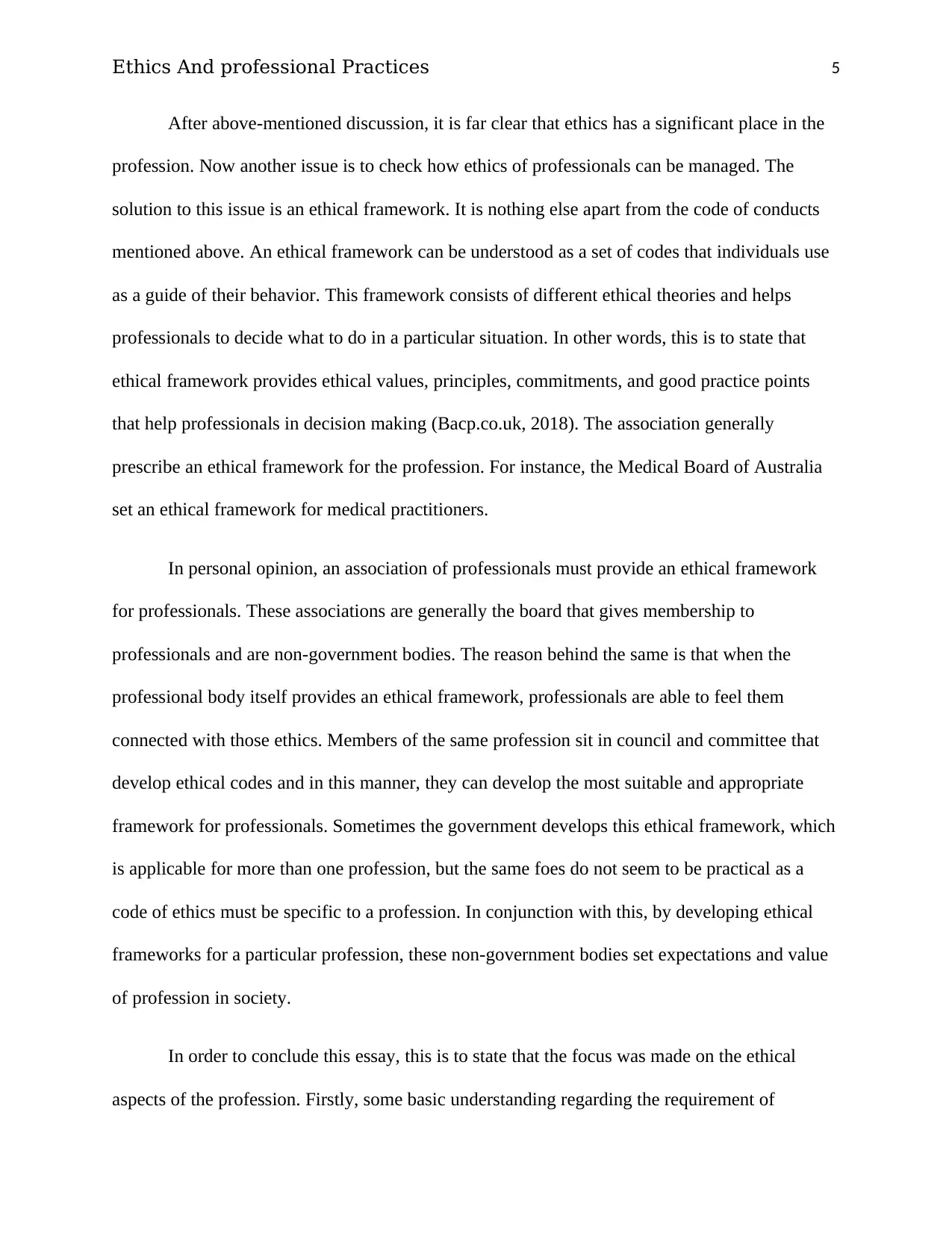
Ethics And professional Practices 5
After above-mentioned discussion, it is far clear that ethics has a significant place in the
profession. Now another issue is to check how ethics of professionals can be managed. The
solution to this issue is an ethical framework. It is nothing else apart from the code of conducts
mentioned above. An ethical framework can be understood as a set of codes that individuals use
as a guide of their behavior. This framework consists of different ethical theories and helps
professionals to decide what to do in a particular situation. In other words, this is to state that
ethical framework provides ethical values, principles, commitments, and good practice points
that help professionals in decision making (Bacp.co.uk, 2018). The association generally
prescribe an ethical framework for the profession. For instance, the Medical Board of Australia
set an ethical framework for medical practitioners.
In personal opinion, an association of professionals must provide an ethical framework
for professionals. These associations are generally the board that gives membership to
professionals and are non-government bodies. The reason behind the same is that when the
professional body itself provides an ethical framework, professionals are able to feel them
connected with those ethics. Members of the same profession sit in council and committee that
develop ethical codes and in this manner, they can develop the most suitable and appropriate
framework for professionals. Sometimes the government develops this ethical framework, which
is applicable for more than one profession, but the same foes do not seem to be practical as a
code of ethics must be specific to a profession. In conjunction with this, by developing ethical
frameworks for a particular profession, these non-government bodies set expectations and value
of profession in society.
In order to conclude this essay, this is to state that the focus was made on the ethical
aspects of the profession. Firstly, some basic understanding regarding the requirement of
After above-mentioned discussion, it is far clear that ethics has a significant place in the
profession. Now another issue is to check how ethics of professionals can be managed. The
solution to this issue is an ethical framework. It is nothing else apart from the code of conducts
mentioned above. An ethical framework can be understood as a set of codes that individuals use
as a guide of their behavior. This framework consists of different ethical theories and helps
professionals to decide what to do in a particular situation. In other words, this is to state that
ethical framework provides ethical values, principles, commitments, and good practice points
that help professionals in decision making (Bacp.co.uk, 2018). The association generally
prescribe an ethical framework for the profession. For instance, the Medical Board of Australia
set an ethical framework for medical practitioners.
In personal opinion, an association of professionals must provide an ethical framework
for professionals. These associations are generally the board that gives membership to
professionals and are non-government bodies. The reason behind the same is that when the
professional body itself provides an ethical framework, professionals are able to feel them
connected with those ethics. Members of the same profession sit in council and committee that
develop ethical codes and in this manner, they can develop the most suitable and appropriate
framework for professionals. Sometimes the government develops this ethical framework, which
is applicable for more than one profession, but the same foes do not seem to be practical as a
code of ethics must be specific to a profession. In conjunction with this, by developing ethical
frameworks for a particular profession, these non-government bodies set expectations and value
of profession in society.
In order to conclude this essay, this is to state that the focus was made on the ethical
aspects of the profession. Firstly, some basic understanding regarding the requirement of
⊘ This is a preview!⊘
Do you want full access?
Subscribe today to unlock all pages.

Trusted by 1+ million students worldwide
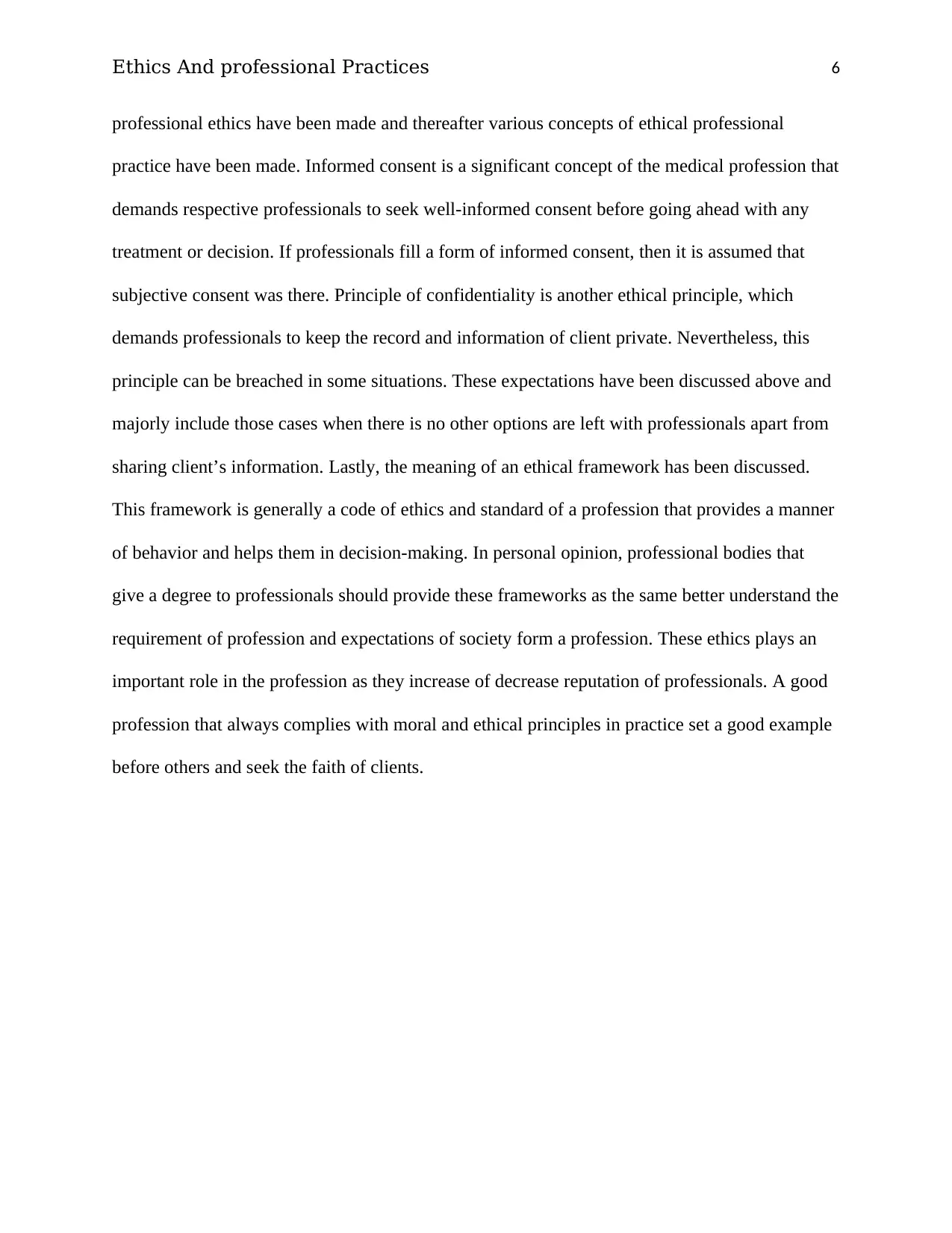
Ethics And professional Practices 6
professional ethics have been made and thereafter various concepts of ethical professional
practice have been made. Informed consent is a significant concept of the medical profession that
demands respective professionals to seek well-informed consent before going ahead with any
treatment or decision. If professionals fill a form of informed consent, then it is assumed that
subjective consent was there. Principle of confidentiality is another ethical principle, which
demands professionals to keep the record and information of client private. Nevertheless, this
principle can be breached in some situations. These expectations have been discussed above and
majorly include those cases when there is no other options are left with professionals apart from
sharing client’s information. Lastly, the meaning of an ethical framework has been discussed.
This framework is generally a code of ethics and standard of a profession that provides a manner
of behavior and helps them in decision-making. In personal opinion, professional bodies that
give a degree to professionals should provide these frameworks as the same better understand the
requirement of profession and expectations of society form a profession. These ethics plays an
important role in the profession as they increase of decrease reputation of professionals. A good
profession that always complies with moral and ethical principles in practice set a good example
before others and seek the faith of clients.
professional ethics have been made and thereafter various concepts of ethical professional
practice have been made. Informed consent is a significant concept of the medical profession that
demands respective professionals to seek well-informed consent before going ahead with any
treatment or decision. If professionals fill a form of informed consent, then it is assumed that
subjective consent was there. Principle of confidentiality is another ethical principle, which
demands professionals to keep the record and information of client private. Nevertheless, this
principle can be breached in some situations. These expectations have been discussed above and
majorly include those cases when there is no other options are left with professionals apart from
sharing client’s information. Lastly, the meaning of an ethical framework has been discussed.
This framework is generally a code of ethics and standard of a profession that provides a manner
of behavior and helps them in decision-making. In personal opinion, professional bodies that
give a degree to professionals should provide these frameworks as the same better understand the
requirement of profession and expectations of society form a profession. These ethics plays an
important role in the profession as they increase of decrease reputation of professionals. A good
profession that always complies with moral and ethical principles in practice set a good example
before others and seek the faith of clients.
Paraphrase This Document
Need a fresh take? Get an instant paraphrase of this document with our AI Paraphraser
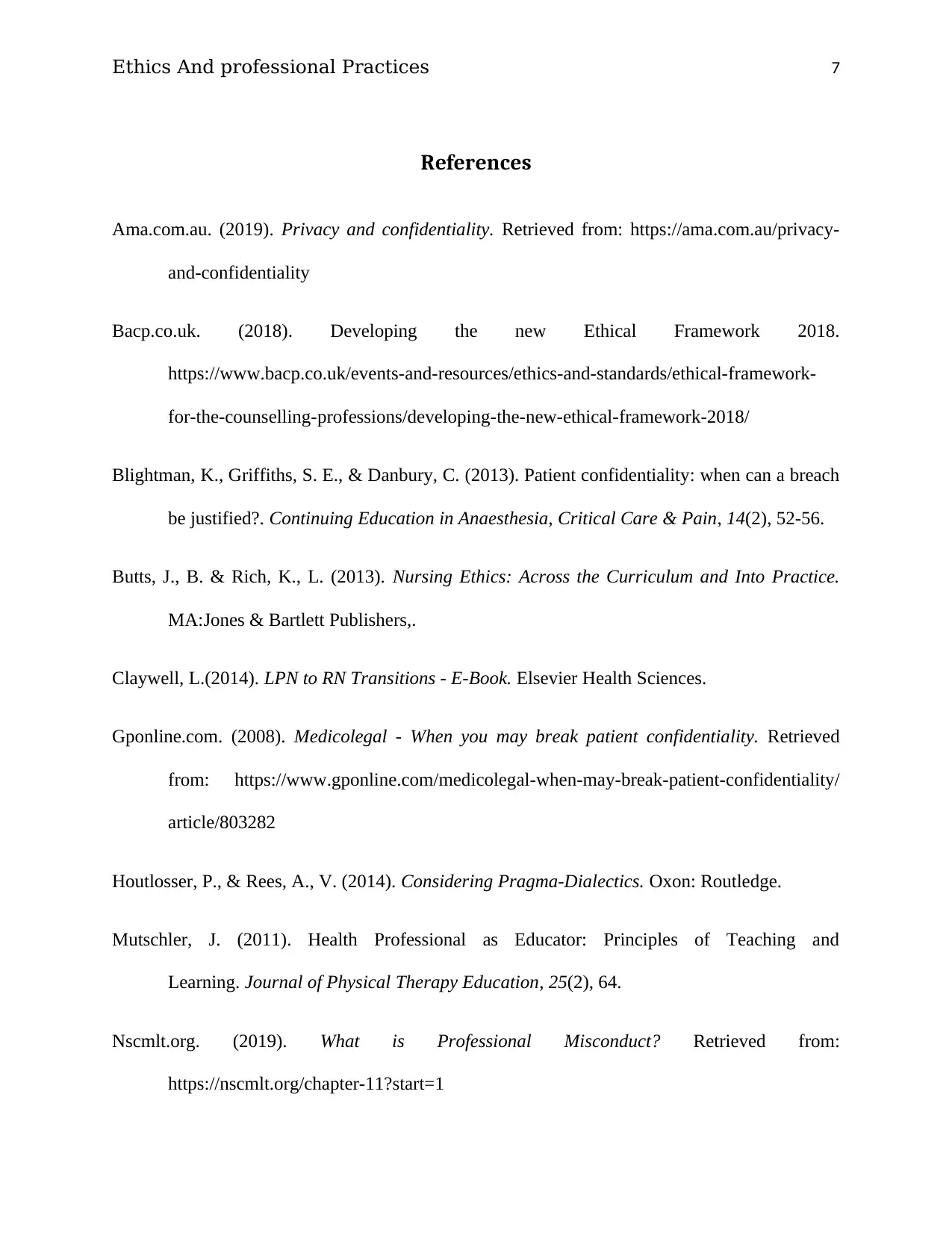
Ethics And professional Practices 7
References
Ama.com.au. (2019). Privacy and confidentiality. Retrieved from: https://ama.com.au/privacy-
and-confidentiality
Bacp.co.uk. (2018). Developing the new Ethical Framework 2018.
https://www.bacp.co.uk/events-and-resources/ethics-and-standards/ethical-framework-
for-the-counselling-professions/developing-the-new-ethical-framework-2018/
Blightman, K., Griffiths, S. E., & Danbury, C. (2013). Patient confidentiality: when can a breach
be justified?. Continuing Education in Anaesthesia, Critical Care & Pain, 14(2), 52-56.
Butts, J., B. & Rich, K., L. (2013). Nursing Ethics: Across the Curriculum and Into Practice.
MA:Jones & Bartlett Publishers,.
Claywell, L.(2014). LPN to RN Transitions - E-Book. Elsevier Health Sciences.
Gponline.com. (2008). Medicolegal - When you may break patient confidentiality. Retrieved
from: https://www.gponline.com/medicolegal-when-may-break-patient-confidentiality/
article/803282
Houtlosser, P., & Rees, A., V. (2014). Considering Pragma-Dialectics. Oxon: Routledge.
Mutschler, J. (2011). Health Professional as Educator: Principles of Teaching and
Learning. Journal of Physical Therapy Education, 25(2), 64.
Nscmlt.org. (2019). What is Professional Misconduct? Retrieved from:
https://nscmlt.org/chapter-11?start=1
References
Ama.com.au. (2019). Privacy and confidentiality. Retrieved from: https://ama.com.au/privacy-
and-confidentiality
Bacp.co.uk. (2018). Developing the new Ethical Framework 2018.
https://www.bacp.co.uk/events-and-resources/ethics-and-standards/ethical-framework-
for-the-counselling-professions/developing-the-new-ethical-framework-2018/
Blightman, K., Griffiths, S. E., & Danbury, C. (2013). Patient confidentiality: when can a breach
be justified?. Continuing Education in Anaesthesia, Critical Care & Pain, 14(2), 52-56.
Butts, J., B. & Rich, K., L. (2013). Nursing Ethics: Across the Curriculum and Into Practice.
MA:Jones & Bartlett Publishers,.
Claywell, L.(2014). LPN to RN Transitions - E-Book. Elsevier Health Sciences.
Gponline.com. (2008). Medicolegal - When you may break patient confidentiality. Retrieved
from: https://www.gponline.com/medicolegal-when-may-break-patient-confidentiality/
article/803282
Houtlosser, P., & Rees, A., V. (2014). Considering Pragma-Dialectics. Oxon: Routledge.
Mutschler, J. (2011). Health Professional as Educator: Principles of Teaching and
Learning. Journal of Physical Therapy Education, 25(2), 64.
Nscmlt.org. (2019). What is Professional Misconduct? Retrieved from:
https://nscmlt.org/chapter-11?start=1
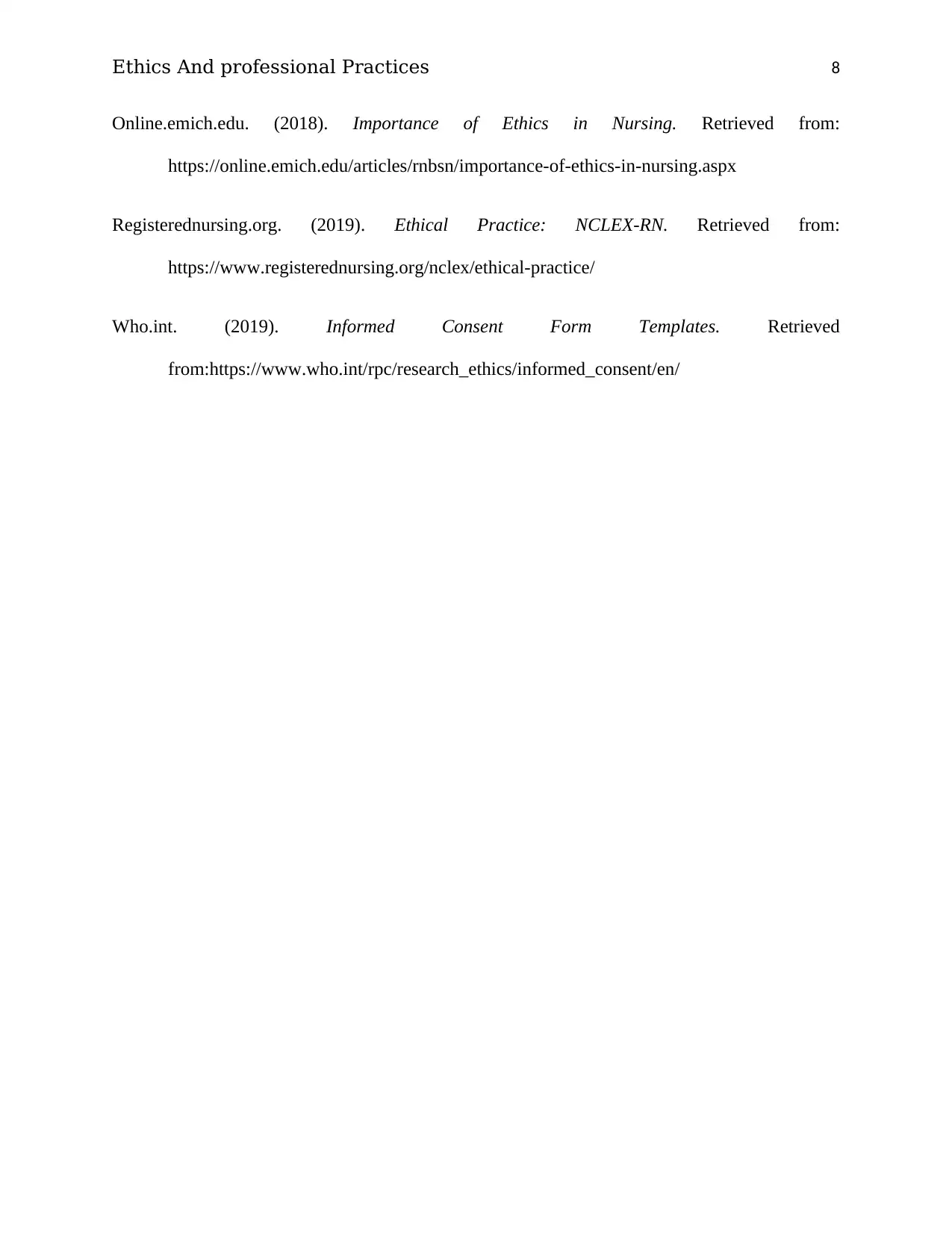
Ethics And professional Practices 8
Online.emich.edu. (2018). Importance of Ethics in Nursing. Retrieved from:
https://online.emich.edu/articles/rnbsn/importance-of-ethics-in-nursing.aspx
Registerednursing.org. (2019). Ethical Practice: NCLEX-RN. Retrieved from:
https://www.registerednursing.org/nclex/ethical-practice/
Who.int. (2019). Informed Consent Form Templates. Retrieved
from:https://www.who.int/rpc/research_ethics/informed_consent/en/
Online.emich.edu. (2018). Importance of Ethics in Nursing. Retrieved from:
https://online.emich.edu/articles/rnbsn/importance-of-ethics-in-nursing.aspx
Registerednursing.org. (2019). Ethical Practice: NCLEX-RN. Retrieved from:
https://www.registerednursing.org/nclex/ethical-practice/
Who.int. (2019). Informed Consent Form Templates. Retrieved
from:https://www.who.int/rpc/research_ethics/informed_consent/en/
⊘ This is a preview!⊘
Do you want full access?
Subscribe today to unlock all pages.

Trusted by 1+ million students worldwide
1 out of 9
Related Documents
Your All-in-One AI-Powered Toolkit for Academic Success.
+13062052269
info@desklib.com
Available 24*7 on WhatsApp / Email
![[object Object]](/_next/static/media/star-bottom.7253800d.svg)
Unlock your academic potential
Copyright © 2020–2026 A2Z Services. All Rights Reserved. Developed and managed by ZUCOL.





